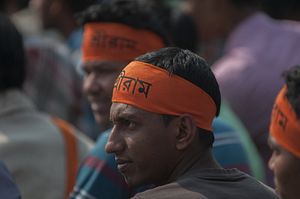On Saturday evening, scores of people from all walks of life descended on Jantar Mantar in New Delhi, some two kilometers away from the Indian parliament, to protest against rising intolerance and mindless violence committed by Hindu fundamentalist groups in different parts of the country. Students, academics, activists, journalists, and many others came together to express their deep anguish and frustration with a rising and troubling trend in India: the targeted killing of individuals who challenge religious orthodoxy.
The event that spurred the protest was the killing of veteran writer Malleshappa Madivalappa Kalburgi. The 76-year-old writer was gunned down inside his home in broad daylight last week, allegedly by two men associated with fringe Hindu radical groups. Kalburgi had long been at loggerheads with Hindu radicals for his outspoken criticism of blind religiosity, superstition, and idol worship.
He was not the first victim at the hand of Hindu extremists in India. In 2013, Narendra Dabholkar, an anti-superstition activist and champion of rationalism, was gunned down in Pune. Earlier this year, Govind Pansare, another rationalist thinker and a critic of blind faith, was shot in Kolhapur. There are scores of writers who face constant threats from these fundamentalist forces in India.
All those killed were septuagenarians and seasoned campaigners for free speech and liberal values. Their free-thinking would ignite debate across the country. However, Hindu fundamentalist forces put an end to all that.
What is more disturbing is the openness with which these radicals operate in India. An activist belonging to the Bajrang Dal, a radical Hindu group sharing deep ideological affinities with the ruling Bharatiya Janata Party (BJP), issued an open threat to other such free-thinkers on Twitter, saying “Then it was UR Ananthamoorty and now its MM Kalburgi. Mock Hinduism and die a dog’s death.”
For his secular and liberal views, Ananthamoorty remained on the firing line of the extremist forces until his death last year.
Commenting on the incident, The Hindu, in an editorial, wrote that “there is no denying the fact that fringe right wing groups have created an atmosphere of intolerance to outspoken writers and academics who question religious practices and myths, thereby putting pressure on freedom of speech and expression.” The editorial asks the government not to go soft on Hindu fundamentalism and to “crack down” on these fringe elements in the same way it would deal with other “religion and ideology based extremist groups.”
Here, one cannot miss the similarities with a recent spate of violence by Islamic fundamentalists in Bangladesh. The modus operandi and motives are the same. Secular bloggers are being killed in Bangladesh because they challenge fundamentalism, question religious practices, and advocate a secular country. Hindu extremist groups are also targeting those who question Hinduism and want India to be a strong secular democracy. They remain just as defiant and devious as the Islamists in Bangladesh.
“This is a battle in defense of pluralism. This is the battle for secularism. This is the struggle for a scientific temper and critical thinking,” says Raghu, a student who came out on Saturday to join the protests in Delhi.
India’s gradual descent into majoritarian fundamentalism is alarming. The growth of anti-secular violence is a warning signal to all the right-thinking citizens of India to resist the growing clout of these medieval forces.

































